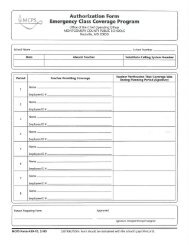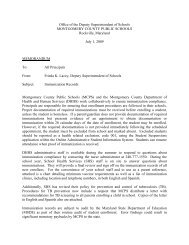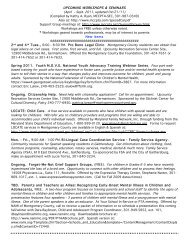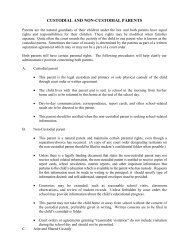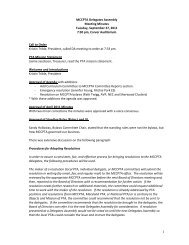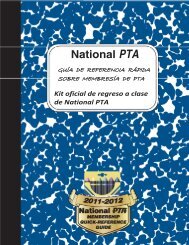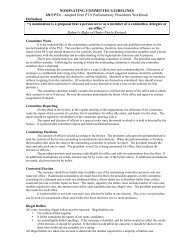Create successful ePaper yourself
Turn your PDF publications into a flip-book with our unique Google optimized e-Paper software.
Montgomery County CouncilofParent Teacher AssociationsDELEGATESGUIDEBOOK2012-20132096 Gaither Road, Suite 204Rockville, MD 20850Telephone: 301-208-0111 Fax: 301-208-2003Email: office@mccpta.<strong>com</strong>Website: www.mccpta.<strong>com</strong>Please note the MCCPTA office will be moving to a new location inDecember of 2012. Please check the website for more information as itbe<strong>com</strong>es available.Hours of Operation: 9:30 am - 1:30 p.m. Monday – Friday (School Year)10 am - 12 pm Tuesday and Thursday (Summer)
THE OBJECTS OF PTAThe Objects of MCCPTA, in <strong>com</strong>mon with those of the National PTA, MarylandPTA, and local PTAs are: To promote the welfare of children and youth in home, school, <strong>com</strong>munity,and place of worship. To raise the standards of home life.To secure adequate laws for the care and protection of children and youth.To bring into closer relation the home and the school, that parents andteachers may cooperate intelligently in the education of children and youth.To develop between educators and the general public such united effort aswill secure for all children and youth the highest advantages in physical,mental, social and spiritual education.The Mission of PTA is threefold:THE MISSION OF PTATo support and speak on behalf of children and youth in our schools, in our<strong>com</strong>munity, and before governmental agencies and other organizations thatmake decisions affecting children;To assist parents in developing the skills they need to raise and protect theirchildren; andTo encourage parent and public involvement in the public schools of thenation.2
MCCPTA DELEGATE: The Voice of PTACongratulations on being chosen to serve your PTA as an MCCPTA Delegate. Participating inDelegates’ Assemblies and your local PTA's meetings allows you to serve as a crucial link between the PTAcouncil and the local PTA. You will share information about what is happening across the school systemwith the members of your PTA, and you will bring the perspective of your PTA members to the discussionsat the county level.The purposes of the Montgomery County Council of PTAs (MCCPTA) are as follows:"To unify and strengthen local PTAs in the council.""To provide for the conference and cooperation of the local PTAs/PTSAs in The PTA councilmembership in order to create a public opinion favorable to the interests of children, toencourage programs and projects in the various local PTAs which will carry out the mission andpurpose of PTA, and to assist in the formation of new PTAs according to the plan of theMaryland PTA.”"To promote the interest of the National PTA and of the Maryland PTA." “To provide leadership training and support for local PTAs in Montgomery County. “Founded in 1944, MCCPTA has grown from fifteen PTAs to more than one hundred ninety localPTAs and PTSAs. This growth reflects the vital role PTAs have had - individually and in council – in meetingthe needs of our children and families.Regular MCCPTA meetings (Delegates’ Assemblies) are held on the fourth Tuesday of the monthduring the school year at 7:30 p.m. at Carver Educational Services Center in Rockville and are open to allPTA members (Special informational programs may be presented from 6:30-7:30pm with the Delegates’Assembly immediately afterward). The privileges of introducing motions, debating, and voting, however, arelimited to the voting body which consists of the delegates from local PTAs (the president, or alternate, andtwo accredited delegates) and the members of the MCCPTA Board of Directors (the officers, area vicepresidents, cluster coordinators, <strong>com</strong>mittee chairs). The monthly meetings provide an opportunity fordelegates to present ideas, debate issues, be<strong>com</strong>e better informed, make personal contacts with other PTAleaders, and vote on MCCPTA business.Expectations and Responsibilities1. Report on the delegate assemblies at local PTA executive board meetings and general membershipmeetings and in newsletter articles, on schools list serves, including any action that might require a vote bythe local PTA.2. Represent the views of the local PTA at delegate assemblies, including any vote taken on issues.3. Keep the local PTA informed of projects and activities of MCCPTA, including opportunities for local PTAmembers to serve on MCCPTA <strong>com</strong>mittees and information distributed at the Delegate Assemblies.4. Be familiar with Robert's Rules of Order, parliamentary procedure, and MCCPTA’s bylaws.5. Notify local PTA members of up<strong>com</strong>ing delegate assemblies, workshops, and forums and encourageattendance.6. Be familiar with the MCPS Operating Budget and Capital Improvements Budget and the views of the localPTA regarding specific items in the budgets.
Attend the special MCCPTA delegate assemblies on the Operating or Capital Budgets in preparationfor public hearings conducted by the Board of Education and the County Council.Encourage the local PTA to discuss and develop priorities, possible solutions, and ideas of their ownand <strong>com</strong>municate their views to the Board of Education or the County Council as appropriate.7. Be prepared to make or amend motions, discuss motions, and cast one vote per delegate on issuesrelating to the education of children - sometimes with out prior direction from the local PTA.8. Be familiar with local, Maryland, and National PTA legislative issues affecting children and education.Be prepared to represent the local PTA at the MCCPTA Legislative Delegate Assembly in Januaryand participate in adopting and supporting legislative priorities for the Maryland General Assemblysession.Be an active advocate for the children of Montgomery County; attend BOE and County Councilhearings, write letters, and send emails and encourage your local PTA leadership to do the same.Encourage local PTA members to participate in legislative advocacy activities of the Maryland PTAand National PTA - Convention, PTA Night in Annapolis, Maryland PTA Summer LeadershipConference and Annual Convention.9. Join the MCCPTA Bulletin and/or Delegate eList in order to stay on top of current information, and todiscuss issues.10. Keep a procedure book containingMCCPTA and local PTA bylaws,List of MCCPTA officers and executive board members,Calendar of events/meetings of MCCPTA and the local PTA,Information items handed out at delegate assemblies,Minutes of MCCPTA delegate assemblies,11. As a Delegate, you must have your voting card to vote at the Delegate Assembly. Each local PTA ismailed three Delegate voting cards and the MCCPTA Bluebook (directory) when dues are paid by eachlocal PTA to MCCPTA. The PTA President distributes the voting cards to their PTA Delegates. Please makesure your local president knows to give you a delegate card. You should also make sure that you have amembership card from your local PTA.The delegate is chosen to represent the views of the local PTA. MCCPTA leadership tries very hardto present major issues and background material early enough so the delegates may have a full month toassess the views of their local PTAs before they vote at the next delegate assembly. Sometimes, this is notpossible. If MCCPTA is to make its voice heard on an issue pending before the Board of Education, theCounty Council, or the Maryland General Assembly, sometimes a month's delay will render such actionuseless. In these instances, the delegates must have the confidence of their PTA in order to vote onemergency issues. They must also make every effort to proceed democratically whenever time allows.Occasionally, the timeliness of an issue requires that the MCCPTA Board of Directors take a position,identified as such, on an issue of importance; such an action is allowed by the MCCPTA bylaws, but doesnot happen often.4
Tips for Keeping Your PTA Informed and Representing Your PTAMany delegates have a standing place on the agenda of their local PTA meetings; some only ask tobe on the agenda when hot issues arise; and others have trouble getting any time at meetings becausetheir PTA is very caught up in local issues and/or has a jam packed agenda. Have a conversation with yourlocal president and encourage him/her to regularly give you time on the agenda. If the agenda is jampacked, there are things you can do to keep your members informed outside of the meetings, and keepyour time at the meetings brief but meaningful.Delegates can write brief summaries of each delegate assembly and send this out via the list serveor PTA newsletter. This can be a very effective way to keep people informed. You might even collaboratewith other delegates within your cluster to take turns writing summaries. Having a regular format withcategories may make it easier for members to follow. For example: Actions taken; informational items;Resolutions and Motions introduced for action next month.When time allows, resolutions and motions are introduced at least a month before the vote takesplace at a delegate assembly. This gives you time to put the resolution before your PTA. It can be muchmore effective to circulate the MCCPTA resolution to your membership through a list serve ahead of timewith a short synopsis and any supporting materials that MCCPTA has supplied, or links to this material onthe MCCPTA website. This gives people familiarity with the issue before the meeting and allows you tobriefly restate the purpose of the resolution rather than going through it in detail.Many times, resolutions are a starting place, and there will be amendments from the floor that youwill be asked to vote on. You may not have had the opportunity to discuss the particulars of specificamendments with your membership. Some delegates bring up potential amendments at their local meetingsto get direction as to how their membership would feel given certain changes. It can be difficult to anticipateeverything and you sometimes have to go on your best judgment to represent your PTA.A practice that is not encouraged is to bring issues and resolutions up at local PTA meetings andthen ask anyone with an opinion to email or call you later. This is sometimes done to save time and/orbecause not everyone feels <strong>com</strong>fortable with the procedural steps of taking a vote on an issue (that’s whyyou watch how the MCCPTA president does it at delegate assemblies). This is not a democratic processand also does not generate the kinds of discussions that help delegates get a sense of how their PTA feelsabout the nuances of a resolution. It is much better to work with your local president to make sure thatthere is an opportunity for the membership to vote on resolutions and motions at your meetings.MCCPTA Procedures for ResolutionsIn order to assure a consistent, fair, and effective process for bringing resolutions to the MCCPTAdelegates, the following procedures will be used.The maker of a resolution (local PTA, individual delegate, or MCCPTA <strong>com</strong>mittee) will submit theresolution in writing (by email, fax, regular mail) to the MCCPTA office. The proposed resolution will bereviewed by the appropriate MCCPTA <strong>com</strong>mittee before the next MCCPTA Board of Directors meeting andthen reported to the Board of Directors with a re<strong>com</strong>mendation for further action. If the resolution needsfurther research or additional materials, the <strong>com</strong>mittee could request additional time to work with the makerof the resolution. If the resolution is already addressed by PTA positions and resolutions (from MCCPTA,Maryland PTA, or National PTA) or is contrary to the Objects and Mission of PTA, the <strong>com</strong>mittee couldre<strong>com</strong>mend that the resolution not be sent to the delegates. If the <strong>com</strong>mittee re<strong>com</strong>mends that theresolution be brought to the delegates, the Board of Directors can refer it to the next Delegates’ Assemblyfor consideration. A resolution presented in this way to a delegate assembly would not be voted on until thenext delegate assembly so that the local PTAs could consider the issue and instruct the delegates.5
Delegates may amend or refer any resolution back to the MCCPTA Board of Directors for furtherwork. A delegate may propose a resolution from the floor at a delegate assembly, and that resolution will bereferred either to the Board of Directors or appropriate <strong>com</strong>mittee for review.If an issue is deemed time-sensitive or an emergency, the MCCPTA <strong>com</strong>mittee reviewing theresolution can request that the delegates receive and vote on the resolution immediately without taking itthrough the Board of Directors. The delegates would be able to consider and vote on the resolution at thedelegate assembly that month as long as five days' notice had been given. The delegates would have tomove to declare it an emergency resolution, and it would take a two-thirds vote of the delegates to agree toconsider it. Adoption of the emergency resolution would be by majority vote. If two-thirds of the delegatesagree to consider the resolution, it may be voted on immediately.MCCPTA Delegates may take positions on issues of county-wide concern by adopting resolutions,simple motions, or position statements such as the Operating Budget Compact. The positions taken areforwarded to the appropriate agencies of government and to the local PTAs. They put all on notice that whatbegan as one local PTA's concern for all children is of sufficient importance to all of us.A Resolution Illustrating Its Own Proper FormWhereas,Whereas,Whereas,Whereas,Resolved,That portion of a resolution <strong>com</strong>prising the phrases starting with the word "whereas"is known as the preamble of the resolution; andThe preamble includes only statements of fact or background information <strong>com</strong>prisingthe reasons for the action proposed in the resolving clauses that are not <strong>com</strong>monknowledge or self-evident and may be overlooked if not stated; andThe action taken on a resolution is really only action on the motion incorporatedsolely in its resolving clauses, not the preamble; andBrevity creates a good listener; therefore, be itThat it is directed that the resolutions submitted to MCCPTA for consideration shallfollow this sample resolution in structure, punctuation, and content.(This sample resolution adapted from New Jersey PTA and National PTA materials.)FACTSFACT: Each local PTA is entitled to three (3) voting Delegates - the President and two Delegates.FACT: The local PTA may have one or more alternate Delegates to attend when one of the regulars cannot.FACT: The local PTA bylaws determine whether Delegates are elected (and by whom) or appointed.FACT: Each school will receive three (3) voting cards upon payment of MCCPTA duesFACT: Delegates represent the position of the local PTA membership at Delegate Assemblies.FACT: There is one vote per Delegate, even if he/she represents two different schools.FACT: Delegates can make or amend motions without prior direction from their local.FACT: Delegates’ Assembly is the 4th Tuesday of each month, 7:30 PM, at the Carver EducationalServices Center, aka the Board of Education.Enjoy being a delegate. You'll meet others who share your interests in education and children and be<strong>com</strong>eeffective advocates together.6




